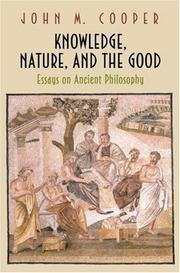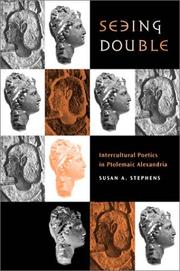| Listing 1 - 2 of 2 |
Sort by
|

ISBN: 0691117241 0691117233 9786612087080 1282087088 1400826446 9781400826445 9780691117232 9780691117249 Year: 2009 Publisher: Princeton, NJ
Abstract | Keywords | Export | Availability | Bookmark
 Loading...
Loading...Choose an application
- Reference Manager
- EndNote
- RefWorks (Direct export to RefWorks)
Knowledge, Nature, and the Good brings together some of John Cooper's most important works on ancient philosophy. In thirteen chapters that represent an ideal companion to the author's influential Reason and Emotion, Cooper addresses a wide range of topics and periods--from Hippocratic medical theory and Plato's epistemology and moral philosophy, to Aristotle's physics and metaphysics, academic scepticism, and the cosmology, moral psychology, and ethical theory of the ancient Stoics. Almost half of the pieces appear here for the first time or are presented in newly expanded, extensively revised versions. Many stand at the cutting edge of research into ancient ethics and moral psychology. Other chapters, dating from as far back as 1970, are classics of philosophical scholarship on antiquity that continue to play a prominent role in current teaching and scholarship in the field. All of the chapters are distinctive for the way that, whatever the particular topic being pursued, they attempt to understand the ancient philosophers' views in philosophical terms drawn from the ancient philosophical tradition itself (rather than from contemporary philosophy). Through engaging creatively and philosophically with the ancient texts, these essays aim to make ancient philosophical perspectives freshly available to contemporary philosophers and philosophy students, in all their fascinating inventiveness, originality, and deep philosophical merit. This book will be treasured by philosophers, classicists, students of philosophy and classics, those in other disciplines with an interest in ancient philosophy, and anyone who seeks to understand philosophy in philosophical terms.
Ancient philosophy --- Antieke filosofie --- Filosofie [Antieke ] --- Filosofie [Griekse ] --- Filosofie [Romeinse ] --- Filosofie van de Oudheid --- Greek philosophy --- Griekse filosofie --- Philosophie ancienne --- Philosophie antique --- Philosophie de l'Antiquité --- Philosophie grecque --- Philosophie romaine --- Philosophy [Ancient ] --- Philosophy [Greek ] --- Philosophy [Roman ] --- Roman philosophy --- Romeinse filosofie --- Philosophy, Ancient. --- Knowledge, Theory of --- Naturalism --- Good and evil --- Théorie de la connaissance --- Naturalisme --- Bien et mal --- #GGSB: Filosofie --- #GGSB: Filosofie (oudheid) --- Théorie de la connaissance --- Philosophy, Greek --- Philosophy, Roman --- Philosophy, Ancient --- Filosofie --- Filosofie (oudheid) --- Academic skepticism. --- Alexander Nehamas. --- Alexander of Aphrodisias. --- Analogy. --- Antiochus of Ascalon. --- Aristotle. --- Arius Didymus. --- Atomism. --- Awareness. --- Cambridge University Press. --- Carneades. --- Chrysippus. --- Concept. --- Counterargument. --- Criticism. --- Democritus. --- Determinism. --- Dialectician. --- Disease. --- Empedocles. --- Epictetus. --- Epicureanism. --- Epicurus. --- Epistemology. --- Ethics. --- Eudaimonia. --- Existence. --- Explanation. --- Explication. --- Eye color. --- Feeling. --- First principle. --- Four causes. --- Glaucon. --- God. --- Good and evil. --- Hedonism. --- Hiero (Xenophon). --- Hypothesis. --- Illustration. --- Immanuel Kant. --- Indication (medicine). --- Inference. --- Ingredient. --- Inquiry. --- Isocrates. --- Lecture. --- Loeb Classical Library. --- Materialism. --- Methodology. --- Morality. --- Mutatis mutandis. --- Natural kind. --- On Ancient Medicine. --- Ontology. --- Parmenides. --- Phenomenon. --- Philosopher. --- Philosophical analysis. --- Philosophical methodology. --- Philosophical theory. --- Philosophy. --- Physician. --- Plato. --- Platonism. --- Potentiality and actuality. --- Practical reason. --- Pre-Socratic philosophy. --- Premise. --- Principle. --- Protagoras. --- Pyrrhonism. --- Quantity. --- Rationality. --- Reality. --- Reason. --- Requirement. --- Rhetoric. --- Self-sufficiency. --- Semen. --- Sextus Empiricus. --- Skepticism. --- Socratic method. --- Socratic. --- Stoicism. --- Suggestion. --- Teleology. --- The Philosopher. --- Theaetetus (dialogue). --- Theoretical physics. --- Theory of Forms. --- Theory. --- Thought. --- Treatise. --- Uncertainty. --- Understanding. --- Value theory. --- Virtue. --- W. D. Ross. --- Writing.

ISBN: 0520229738 9780520927384 0520927389 0585466491 9780585466491 1597348899 9781597348898 9786612356674 6612356677 9780520229730 1282356674 9781282356672 Year: 2003 Volume: 37 Publisher: Berkeley University of California Press
Abstract | Keywords | Export | Availability | Bookmark
 Loading...
Loading...Choose an application
- Reference Manager
- EndNote
- RefWorks (Direct export to RefWorks)
When, in the third century B.C.E., the Ptolemies became rulers in Egypt, they found themselves not only kings of a Greek population but also pharaohs for the Egyptian people. Offering a new and expanded understanding of Alexandrian poetry, Susan Stephens argues that poets such as Callimachus, Theocritus, and Apollonius proved instrumental in bridging the distance between the two distinct and at times diametrically opposed cultures under Ptolemaic rule. Her work successfully positions Alexandrian poetry as part of the dynamic in which Greek and Egyptian worlds were bound to interact socially, politically, and imaginatively.The Alexandrian poets were image-makers for the Ptolemaic court, Seeing Double suggests; their poems were political in the broadest sense, serving neither to support nor to subvert the status quo, but to open up a space in which social and political values could be imaginatively re-created, examined, and critiqued. Seeing Double depicts Alexandrian poetry in its proper context-within the writing of foundation stories and within the imaginative redefinition of Egypt as "Two Lands"-no longer the lands of Upper and Lower Egypt, but of a shared Greek and Egyptian culture.
Comparative literature --- Egyptian poetry --- Greek poetry, Hellenistic --- Language and culture --- Poetics --- Egyptian and Greek. --- Greek and Egyptian. --- History and criticism. --- History --- -Greek poetry, Hellenistic --- -Language and culture --- -Literature, Comparative --- -Poetics --- -Poetry --- Literature, Comparative --- Philology --- Culture and language --- Culture --- Hellenistic Greek poetry --- Greek literature, Hellenistic --- Egyptian literature --- History and criticism --- Egyptian and Greek --- Greek and Egyptian --- -Technique --- Ptolemaic dynasty --- Alexandria (Egypt) --- -Intellectual life --- Poésie grecque hellénistique --- -Poésie égyptienne --- Littérature comparée --- Langage et culture --- Histoire et critique --- Grecque et égyptienne --- Egyptienne et grecque --- Ptolemaic dynasty, --- Alexandrie (Egypte) --- Intellectual life. --- Vie intellectuelle --- Iskandarīyah (Egypt) --- Alexandrie (Egypt) --- Aleksandriyah (Egypt) --- Alessandria (Egypt) --- Alexandreia (Egypt) --- Aleksandria (Egypt) --- Alexantreia (Egypt) --- Alesandriʼa (Egypt) --- الإسكندرية (Egypt) --- الإسكندرية (مصر) --- اسكندرية (Egypt) --- Poetry --- Technique --- Ptolemies, --- alexandrian court. --- alexandrian poetry. --- alexandrian poets. --- ancient egypt. --- ancient greece. --- apollonius. --- argonautica. --- callimachus. --- egypt. --- egyptian culture. --- egyptian history. --- egyptian people. --- egyptian poetry. --- greek poetry. --- helen. --- hellenism. --- heracles. --- hiero of syracuse. --- hymns. --- literary criticism. --- literary theory. --- mythology. --- nonfiction. --- pharoah. --- poetics. --- poetry. --- political values. --- ptolemaic court. --- ptolemies. --- ptolemy philadelphus. --- regencies. --- royalty. --- rulers. --- theocritus. --- theogonies.
| Listing 1 - 2 of 2 |
Sort by
|

 Search
Search Feedback
Feedback About UniCat
About UniCat  Help
Help News
News